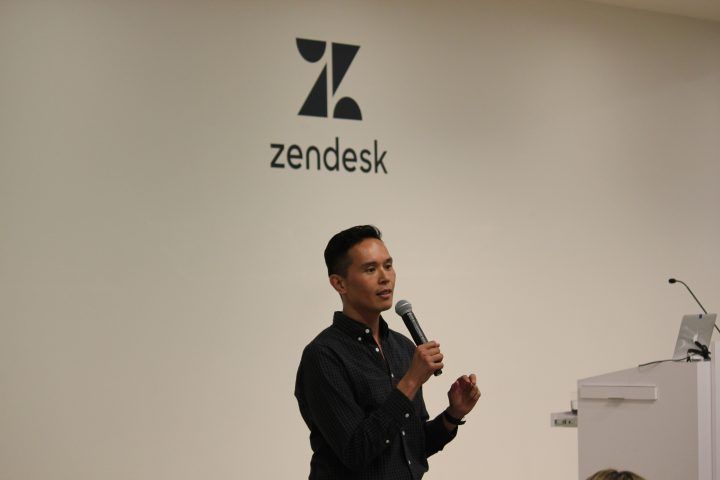Navigating the Ups and Downs of Life as a Tech Nonprofit Founder

Rey Faustino, Founder and CEO of One Degree, is an incredible social entrepreneur as well as an alum of Fast Forward’s very first accelerator cohort. One Degree is like a Yelp for social services: it digitizes critical community resources, enabling anyone to search, comment, save, and share. When One Degree came through the Fast Forward program in 2014, they were only serving San Francisco County. Today, One Degree is serving all nine Bay Area counties and just launched in Los Angeles – the most populous county in the United States. Needless to say, we were thrilled to welcome Rey back to speak with our 2017 cohort at Zendesk last week, where he shared some valuable insights.
Beware of Lumpy Funding
Funding comes and goes. Rey empathized that funding is never guaranteed for tech nonprofits. It’s not unusual for organizations to see their bank accounts go up and down like rolling hills. Organizations may go for long stretches without funding, and then suddenly secure huge grants they’ve been working to close for months. Don’t get discouraged, though. Most importantly, plan for long-term success and never take your eye off fundraising, even if you feel comfortable at the time.
With this in mind, Rey doesn’t budget for funding on a year-to-year basis, but on a three year basis. This makes it easier to accurately project funding, both for your own records and for communication with potential new funders.
Put Yourself First
No one else is going to be as passionate about your work as you are. This might compel you to think only of your organization at the expense of your well-being. This is a mistake. When Rey first founded One Degree, he was not taking care of himself, which caused him to frequently get sick, partly because of stress and partly because he wasn’t taking any days off. Working so hard can be counter-productive; if you don’t take care of yourself, the quality of your work ultimately suffers. When starting an organization, investing in your own health and wellness will pay off when you are able to consistently operate at your best. Get sleep, exercise, eat well, and make time for yourself.
How Do You Know When To Hire?
Rey shared straightforward advice: “Hire when it hurts.” Small teams have hidden strengths. Employees self-assign projects and command many different roles at any given point. But when the lack of a designated specialist begins to undermine the strength of your organization, it’s time to hire.
In the early days as CEO, Rey was wearing many hats—fundraising, marketing, community growth—and this caused problems. He was so focused on growth he couldn’t give fundraising the full attention it deserved, which hurt the organization. Hiring a marketing specialist helped bring a new level of stability to his operations and allowed them to grow more effectively.

How do you approach fundraising if a big competitor is getting grants from all your target funding sources?
First of all, the label “competitor” isn’t as relevant in the nonprofit space. Any “competitors” are all working towards the same goal: to make something better in the world. The existence of other organizations dedicated to your mission provides added credibility to the work you are doing. However, funding can be a serious challenge when a similar organization is a darling among funders in your sector. Rey realized in order to attract more funders, he needed to figure out what his core value proposition was.
Once he realized that One Degree’s advantage was its ability to build technology tailored to the needs of at-risk communities, fundraising became easier. Little things can make all the difference. For example, One Degree allows users to register without an e-mail address, as many of their target users may not have one. This shows they understand their target population better than any other organization in the market.
Figure out what sets you apart and makes your organization uniquely suited to solve a problem differently. Be vocal about your areas of expertise. Show funders that you understand the small details that other organizations wouldn’t even think of, but are obvious to you because you really understand the problem and the people you serve.
Defining and Reporting Impact
When One Degree first started thinking about how to quantify its impact, Rey assumed this would be a measure of how many people used the platform. During his time at Fast Forward he quickly learned that he was relying on a vanity metric (which you can learn more about here).
Building up One Degree’s user base was a good first step, but it was not the ultimate goal. The ultimate goal was to help families build a path towards economic mobility and stability.
So, he redefined his impact metrics to reflect this “improvement of life” focus:
- Are people finding relevant resources
- Are people actually utilizing those resources?
- How is that utilization actually improving their life
When funders demand to see the impact in clear, hard numbers, point out that impact assessment is incredibly difficult for this type of work. Any young nonprofit that says differently isn’t being honest with themselves or with funders. By nature, your work’s impact cannot be easily defined. Emphasize the differences between outputs and outcomes, and be patient as you find a process for determining your impact. Funders will appreciate this honesty and work with you to help you define that process.
Thank you so much to our incredible alumnus Rey Faustino for coming back to Fast Forward to pay it forward, and set up our new cohort for success with the knowledge they need to thrive in this growing industry.